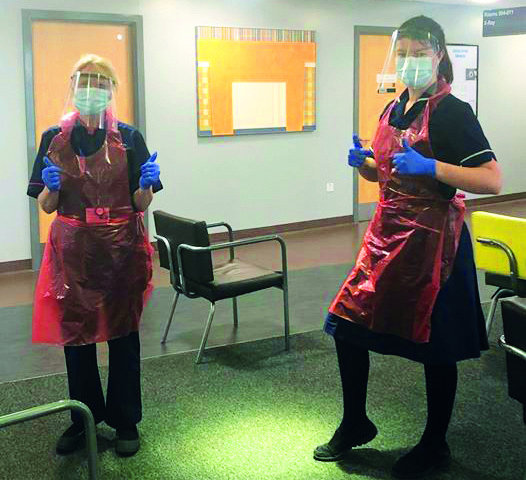There are several co-op and employee-owned providers in the UK social care sector which are having had to adapt to life under the Covid-19 lockdown.
One such organisation is Equal Care Co-op, an emerging platform co-op in the Calder Valley, West Yorkshire.
Still in the early stages of its development, Equal Care hasn’t been faced with challenges on the scale of larger organisations which have a large roster of colleagues, and people getting support, to make provision for.
But Emma Back, one of the founders of the organisation, says it has faced some difficult decisions – and the sociocracy model of governance, baked into Equal Care’s co-operative model, helped it find answers.
“Our registration with the Care Quality Commission is still pending so we can’t take referrals from the local authority,” she says, “and lockdown means the number of people looking for support from us is falling as people self-isolate.
“That means we’ve had to furlough people – but that’s been done with full consent, a decision made with the whole team. Sociocracy worked: the decision about how and when, the ins and outs of it, were made by building consensus among the team.”
Government furlough support has helped with staff, but for Equal Care’s independent care worker members, they are in a tough position. They are all newly self-employed so are not eligible for state support other than universal credit.
“What we’ve done is accelerated a plan for a bread fund, using the £10,000 small business rate relief; we are putting that in as seed money,” adds Ms Back. “Independent care workers, people and families getting support and investors can all contribute, to help ensure there is a safety net. It’s designed to cover lost income for when people have lost clients through self isolation.”
This is in line with Equal Care’s effort to build a fairer and safer gig economy model using the ideas of the platform co-op movement.
The co-op – which has supplied PPE to all those involved in its operations, including family members – is also making a shift to online and remote working, not just in terms of admin but also in terms of emotional support and team liaison.
Ms Back thinks this will lead to more permanent changes, as people find remote work is often more productive – and productivity is hugely beneficial to people getting support, in terms of care outcomes. And there are wider cultural benefits too in terms of tackling loneliness.
“I think it’s interesting that my 96-year-old nan knows how to use Zoom,” she adds. “This is a completely new thing … this virus has created more digital inclusion in three weeks than a decade’s worth of work has managed.”
Life in lockdown has also encouraged more supportive practice among colleagues, she says. “We’re doing a lot of buddying and there’s a daily check-in for connection, support and wellbeing.”
Lockdown is also allowing the team to finish its induction process and complete its training in the organisation’s co-op model.
“Principle 5, education, is important and people are adapting to the ideas under the Equal Care model – around platform co-operativism, sociocracy and distributed leadership.
“And team members are volunteering for the NHS and getting involved in mutual aid – there is more time to do that.”

Meanwhile, Be Caring, an employee-owned provider of domestic social and healthcare support in Leeds, Newcastle, Liverpool and Manchester, is working to continue care and support but warns this “might need to change, for example, reduced call times, additional ‘pop-ins’, shopping calls, and working local volunteer groups to provide additional support”.
Lockdown brings a range of complications and extra pressures, with people getting support, and their families, self isolating; and care workers and their families doing the same, it says. Care workers with children have also found their ability to work and provide care continuity affected by school closures and childcare needs.
To make matters harder, Be Caring says the closure of local services and community groups potentially increases the care and support that people need.
In response, Be Caring has been contacting everyone its team supports to agree any changes – including planned reductions as the outbreak impacts its workforce.
City Health Care Partnership CIC (CHCP), an employee-owned business which offers health and care services in Hull, the East Riding of Yorkshire, Knowsley, Wigan and St Helens, has teamed up with other organisations to tackle the crisis. This includes Dove House Hospice in Hull, where an empty bedded unit is being used for Covid-19 patients who need intermediate care and rehabilitation after being discharged from hospital.
This will help to free up beds at Hull Royal Infirmary and Castle Hill for people who need hospital treatment for coronavirus.
The Needler unit has 12 beds and is a self-contained unit with its own entrance, separate from the main hospice site. It will be staffed by CHCP’s nurses and allied health professionals.
Dr Anna Wolkowski, chief executive of Dove House, said: “We’re proud to be supporting each other at this tough time to provide essential care as well as providing support to the local community to overcome this pandemic.”
Julia Petty, general manager of integrated community services at CHCP, said, “I have been absolutely overwhelmed by the staff working and pulling together in making the Needler unit at Dove House a reality. While it has been very busy – everyone has tackled it with a true problem solving approach and nothing has been too much trouble for anyone.”